THE STATE OF THINGS, LO STATO DELLE COSE, OCA NORWAY AT THE 54TH VENICE BIENNALE
Office for Contemporary Art Norway
Announces
‘THE STATE OF THINGS’
at the 54th International Art Exhibition,
La Biennale di Venezia
1 June–17 November 2011
http://www.oca.no/international/venice_11.shtml
ABOUT ‘THE STATE OF THINGS’:
The Office for Contemporary Art Norway (OCA), as commissioner of Norway’s representation at the 54th Biennale di Venezia, would like to announce ‘The State of Things’, a series of public lectures that will be held throughout the Biennale period, reflecting upon themes such as diversity, the environment, peace-making, human rights, capital, migration, asylum, Europe, aesthetics and revolution. Each presentation aims to tackle the ‘state of things’ today, drawing from the speakers’ fields of activity and research, and from what they consider the intellectual and political priorities of today.
The programme takes its cue from the Nansen Passport, created by Norwegian diplomat and explorer Fridtjof Nansen at the end of World War I in an attempt to enable refugees to move across borders in search of political and intellectual shelter.
Wednesday, 1 June / 17:00
Jacques Rancière – In What Time Do We Live?
The state of things is always a state of time. Issues of domination and emancipation are encapsulated in some basic questions: in what time do we live? To what form of historical evolution does our present belong? What futures does it open? From this point of view, this paper will analyse the paradigms of temporality that ground the dominant descriptions of our present, and the ways in which political action and artistic invention can reframe and disrupt them.
at Istituto Veneto di Scienze, Lettere ed Arti, Campo Santo Stefano, San Marco 2842, Venice
Jacques Rancière is a philosopher whose work looks at emancipatory politics and its relationship to aesthetics.
Thursday, 2 June / 11:00
Leo Bersani – Illegitimacy
‘The state creates us by naming us.’ These words, which conclude Pierre Bourdieu’s Pascalian Meditations, condense the lessons of Bourdieu’s lifelong work of exposing the hierarchical classifications by which the social order identifies and legitimises our social existence. To what degree might an effective resistance to oppressive social orders depend on our making ourselves unnamable? And to what extent does this in turn depend on our refusing to be socially, morally and sexually legitimated by the networks of power we inescapably inhabit? With references to Bourdieu, Jean Genet and Todd Haynes’s film Safe, this presentation will attempt to examine strategies of negativity as pre-conditions for inventing what Michel Foucault called ‘new relational modes’.
at Istituto Veneto di Scienze, Lettere ed Arti, Campo Santo Stefano, San Marco 2842, Venice
Leo Bersani is a theorist specialising in literature, psychoanalysis and the visual arts.
Friday, 3 June / 10:00
Vandana Shiva – The War Against the Earth
Why does the dominant economic model fail to meet the needs of so many societies and communities? Why is success measured by economic growth, so intimately related to increased poverty, hunger and thirst? As the dominant economy myopically focuses on the working of the market, it ignores both nature’s economy and the sustenance economy, on which it depends. Not only does the dominant growth model ignore nature, it is based on a war against the Earth. This paper will speak about this war, and propose instead manners of making peace with the Earth through the notion of ‘Earth democracy’. This notion will be articulated through the concrete practices of Navdanya, the movement for biodiversity conservation and ecological agriculture. As Navdanya’s experience shows, paradigms and practices that make peace with nature also address issues of poverty and hunger.
at Istituto Veneto di Scienze, Lettere ed Arti, Campo Santo Stefano, San Marco 2842, Venice
Vandana Shiva is an author, environmental activist and eco-feminist.
Friday, 3 June / 11:00
Jan Egeland – Ten Lessons from Ten Peace Processes
On behalf of the Norwegian Government, the United Nations and several NGOs, Jan Egeland has been a facilitator or mediator in numerous peace efforts in the Middle East, Africa, Europe and Latin America. He was part of the team behind the secret Norwegian Channel between Israel and the PLO that led to the Oslo Accords in 1993, and was involved in the Guatemala Peace Accords in 1996. Although each war and conflict party is unique, there are some general lessons that can be drawn from every peace effort for the benefit of a more effective approach in the future. This lecture will take such experience as the basis for ten hard-won lessons.
at Istituto Veneto di Scienze, Lettere ed Arti, Campo Santo Stefano, San Marco 2842, Venice
Jan Egeland has been a mediator, diplomat and activist in numerous peace efforts and humanitarian crises around the world.
Saturday, 4 June / 11:00
Fawaz A. Gerges – A Perfect Storm: An Arab Revolution in the Making?
As the Arab revolutions sweep away autocrats in Tunisia, Egypt and elsewhere, the omnipotence of the Mukhabarat, or security-controlled state, appears to be crumbling. In particular, the inability of former President Hosni Mubarak’s much-feared security apparatus to suppress protesters and retain the status quo signals the beginning of the fall of the Arab authoritarian wall. Against all odds, millions of Arabs – men and women – have taken to the streets and called for change and freedom, risking their lives. Emboldened, protesters are no longer satisfied with minor reforms. They are demanding substantive political change – restructuring of closed Arab societies along pluralistic lines. This lecture addresses the current prospects of a democratisation of the Arab world, challenging the pretence that Islam and Muslims are incompatible with democracy.
at Aula Magna, Università Iuav di Venezia, Tolentini, Santa Croce 191, Venice
Fawaz A. Gerges is a political theorist who specialises in the Middle East.
Thursday, 30 June / 17:30
Eyal Weizman – Forensic Aesthetics
The last decades of the twentieth century, often referred to as ‘the era of the witness’, were saturated with representation of testimonies of trauma – written, recorded, filmed archived and exhibited. This primacy of trauma as a site of history also lead to a depoliticised ‘politics of compassion’ apparent in the forums of transitional justice, truth commissions, human rights and humanitarianism. However, a recent shift of emphasis from human testimony to material forensics means that science has begun invading some of the legal and cultural grounds previously reserved for the speech of humans. Potentially, therefore, at its most extreme, new ways of using forensic science have blurred a previously held distinction: between evidence, when the law speaks of objects, and that of the witness, referring to subjects. Such shift has aesthetic, political and ethical implications, dangers and potentials that will be unpacked in this lecture.
at Aula Tafuri, Palazzo Badoer, Università Iuav di Venezia, Calle della Lacca, San Polo 2468, Venice
Eyal Weizman is an architect and theorist who has worked in and written on space and politics in zones of conflict worldwide.
Wednesday, 7 September / 18:00
Judith Butler – The Politics of the Street and New Forms of Alliance
Although some have argued that the politics of the street has been replaced by new media politics, it seems that the public sphere within which politics takes place is now defined by a specific mode of bodies interacting with media. Hannah Arendt once argued that there could be no exercise of freedom without the creation of a ‘space of appearance’ and even ‘a right to appear’. How do we understand those new forms of democratic insurgency that form alliances that are not in coalitional forms? Who is the embodied ‘we’ on the street transported through media, and yet in place and at risk?
at Fondazione Querini Stampalia, Campo Santa Maria Formosa, Castello 5252, Venice
Judith Butler is a philosopher who has contributed to the field of feminism, queer theory, political philosophy and ethics.
Thursday, 8 September / 18:00
Franco Berardi – The ‘Movimento Studentesco’ and Pier Paolo Pasolini: A Misunderstanding
In 1968 the relation between Pier Paolo Pasolini and the Student Movement in Italy was a troubled one. In the midst of the controversy, Pasolini was accused by the students of being a populist representative of a backward culture, nostalgic of a legendary pre-modern time. This paper will argue that, from today’s perspective, things seem different, and Pasolini can be understood not to have been looking to the past but to the distant future that is now our present: an age characterised by barbarianism and of ignorant aggressiveness. Today, in the age of the televisual and financial dictatorship, reading Pasolini is a way to retrace the genesis of Italy’s present.
at Laboratorio Occupato Morion, Salizada San Francesco della Vigna, Castello 2842,Venice
Franco Berardi is a media theorist and activist with a special interest in education.
Thursday, 20 October / 17:30
Saskia Sassen – When the Acute Challenges of Our Epoch Materialise in Cities
Cities have long been sites for conflicts, including wars, racism, religious hatred and exclusion of the poor. And yet, while national states have historically responded by militarising conflict, cities have tended to triage conflict through commerce and civic activity. Major developments in the current global era signal that cities are losing this capacity, and becoming sites for a whole range of new types of conflicts, such as asymmetric war, urban violence and acute environmental challenges. Further, the dense and conflictive spaces of cities, overwhelmed by inequality and injustice, can become the sites for a variety of secondary, more anomic types of conflicts, from drug wars to the major environmental disasters looming in our immediate futures. All of these challenge the traditional commercial and civic capacity that has allowed cities to avoid war more often than not, when confronted with conflict, and to incorporate diversity of class, culture, religion and ethnicity.
at Aula Tafuri, Palazzo Badoer, Università Iuav di Venezia, Calle della Lacca, San Polo 2468, Venice
Saskia Sassen is a sociologist whose work focuses on migration and transnationality; she is the author of Territory, Authority, Rights (2006).
Thursday, 17 November / 18:00
T.J. Clark – The Experience of Defeat
Whether or not the present Restoration is invulnerable, the Left in advanced capitalist countries has lived for the past two decades looking failure square in the face. The disappearance of a Left alternative from the space of politics, or even from the space of political imagination, remains the great fact of our time. Taking its title from Christopher Hill’s great study of radical writing after the English Civil War, this lecture is concerned, as part of that work, with the Left’s sense of progress. It asks what it could mean to a Left politics for it no longer to consider itself ‘on the side of history’ – not to imagine its task, in other words, as the realisation of the baulked potentials of capitalism and/or modernity, not to see its eventual victory written into the DNA of an economic order, not to posit some version of utopia, not, in a word, to ‘have the future in its bones’. Is a Left with no future a contradiction in terms? If not the future, then what? Is it only the Right that can (imaginatively, politically) dispense with the myth of freedom in full possession of technics? What aims and imagery might there be for an ‘un-modernity’ to come?
at Auditorium Santa Margherita, Università Ca’ Foscari Venezia, Campo Santa Margherita, Dorsoduro 3689, Venice
T.J. Clark is an art historian who has written about modernism and its politics.
Norway’s representation in Venice in 2011 is commissioned by OCA and organised by its director, Marta Kuzma and its associate curator, Pablo Lafuente, together with Peter Osborne, director of the Centre for Research in Modern European Philosophy at Kingston University, London. Norway’s representation at the 54th International Art Exhibition, La Biennale di Venezia, also includes ‘Beyond Death: Viral Discontents and Contemporary Notions about AIDS’, a graduate programme by Bjarne Melgaard at the Faculty of Design and Arts, Università Iuav di Venezia.
..)(..
L’Office for Contemporary Art Norway
annuncia
“THE STATE OF THINGS”
alla 54. Esposizione Internazionale d’Arte,
La Biennale di Venezia
1 giugno–17 novembre 2011
“THE STATE OF THINGS” (“LO STATO DELLE COSE”):
L’Office for Contemporary Art Norway (OCA), in funzione di commissario per la partecipazione della Norvegia alla 54. Esposizione Internazionale d’Arte, la Biennale di Venezia, è lieto di annunciare “The State of Things”, una serie di conferenze aperte al pubblico, in programma per l’intera durata della Biennale, che riflettono su tematiche quali l’ambiente, i rapporti di pace, i diritti umani, il capitale, la migrazione, l’asilo politico, l’Europa, l’estetica e la rivoluzione. Ogni conferenza affronterà lo “stato delle cose” oggi, attingendo dal campo di attività e di ricerca di ogni relatore, e da quello che loro considerano una priorità intellettuale e politica assoluta del giorno.
Il programma prende a riferimento il Passaporto Nansen, concepito dall’esploratore, scienziato e diplomatico norvegese Fridtjof Nansen alla fine della Prima Guerra Mondiale, che sarebbe stato in grado di legittimare i rifugiati che si fossero spostati oltre frontiera in cerca di asilo politico e intellettuale.
Mercoledì 1 giugno, ore 17.00
Jacques Rancière, In che tempo viviamo? (In What Time Do We Live?)
Jacques Rancière è un filosofo i cui scritti si rivolgono ad una politica emancipatoria e alle sue relazioni con l’estetica.
All’Istituto Veneto di Scienze, Lettere ed Arti, Palazzo Franchetti, Campo Santo Stefano, San Marco 2842, Venezia
Giovedì 2 giugno, ore 11.00
Leo Bersani, Illeggittimità (Illegitimacy)
Leo Bersani è un teorico spacializzato in letteratura, psicoanalisi e nelle arti visive.
All’Istituto Veneto di Scienze, Lettere ed Arti, Palazzo Franchetti, Campo Santo Stefano, San Marco 2842, Venezia
Venerdì 3 giugno, ore 10.00
Vandana Shiva, La guerra contro la terra (The War Against the Earth)
Vandana Shiva è una scrittrice, attivista ambientale e eco-femminista.
All’Istituto Veneto di Scienze, Lettere ed Arti, Palazzo Franchetti, Campo Santo Stefano, San Marco 2842, Venezia
Venerdì 3 giugno, ore 11.00
Jan Egeland, Dieci lezioni da dieci processi di pace (Ten Lessons from Ten Peace Processes)
Jan Egeland è stato mediatore, diplomatico e attivista in numerosi processi di pace in seguito a crisi umanitarie nel mondo.
All’Istituto Veneto di Scienze, Lettere ed Arti, Palazzo Franchetti, Campo Santo Stefano, San Marco 2842, Venezia
Sabato 4 giugno, ore 11.00
Fawaz A. Gerges, Una tempesta perfetta: sta avvenendo una rivoluzione araba?
(A Perfect Storm: An Arab Revolution in the Making?)
Fawaz A. Gerges si occupa di teoria politica ed è specializzato nella situazione in Medio Oriente.
All’Aula Magna, Università Iuav di Venezia, Tolentini, Santa Croce 191, Venezia
Giovedì 30 giugno, ore 17.30
Eyal Weizman, Estetica Forense (Forensic Aesthetics)
Eyal Weizman è un architetto e teorico che ha lavorato e scritto sullo spazio e le politiche in zone di conflitto mondiali.
All’Aula Tafuri, Palazzo Badoer, Università Iuav di Venezia, Calle della Lacca, San Polo 2468, Venezia
Mercoledì 7 settembre, ore 18.00
Judith Butler, Le politiche della strada e le nuove forme di alleanza
(The Politics of the Street and New Forms of Alliance)
Judith Butler è una filosofa che ha contribuito al campo del femminismo, della teoria queer, della filosofia politica e etica.
Alla Fondazione Querini Stampalia, Campo Santa Maria Formosa, Castello 5252, Venezia
Giovedì 8 settembre, ore 18.00
Franco Berardi, Il movimento studentesco e Pier Paolo Pasolini: un malinteso
(The ‘Movimento Studentesco’ and Pier Paolo Pasolini: A Misunderstanding)
Franco Berardi è un teorico dei media e un attivista con un particolare interesse per l’educazione.
Al Laboratorio Occupato Morion, Salizada San Francesco della Vigna, Castello 2951, Venezia
Giovedì 20 ottobre, ore 17.30
Saskia Sassen, Quando le sfide fondanti della nostra epoca si materializzano in città
(When the Acute Challenges of Our Epoch Materialise in Cities)
Saskia Sassen è una sociologa che lavora sulla migrazione e la transnazionalità.
All’Aula Tafuri, Palazzo Badoer, Università Iuav di Venezia, Calle della Lacca, San Polo 2468,Venezia
Giovedì 17 novembre, ore 18.00
T.J. Clark, L’esperienza della sconfitta (The Experience of Defeat)
T.J. Clark è uno storico dell’arte che nei suoi scritti si è occupato del modernismo e delle sue politiche.
All’Auditorium Santa Margherita, Università Ca’ Foscari Venezia, Campo Santa Margherita, Dorsoduro 3689, Venezia
La partecipazione della Norvegia a Venezia per il 2011 viene commissionata dall’Office for Contemporary Art Norway (OCA) e organizzata dal suo direttore Marta Kuzma, dal curatore associato all’OCA Pablo Lafuente e da Peter Osborne, direttore del Centro di Ricerca in filosofia europea moderna alla Kingston University di Londra. La partecipazione della Norvegia alla 54. Esposizione Internazionale d’Arte, la Biennale di Venezia, include inoltre il programma d’insegnamento ‘Beyond Death: Viral Discontents and Contemporary Notions about AIDS’, sviluppato da Bjarne Melgaard nell’ambito del Corso di Laurea Magistrale in Progettazione e Produzione delle Arti Visive, Facoltà di Design e Arti dell’Università Iuav di Venezia.

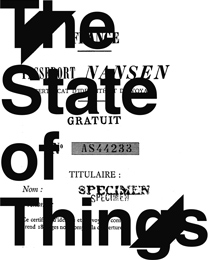
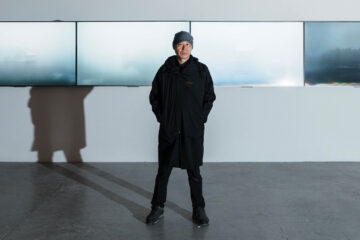
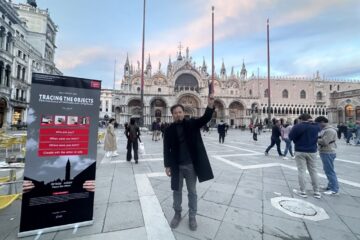
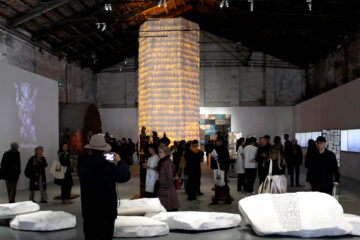
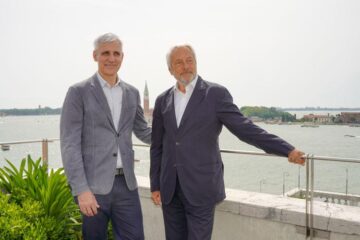

No Comment